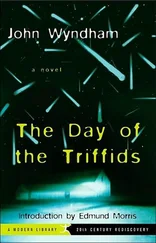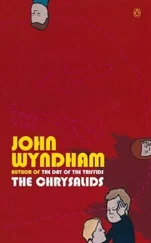John Wyndham - The Midwich Cuckoos
Здесь есть возможность читать онлайн «John Wyndham - The Midwich Cuckoos» весь текст электронной книги совершенно бесплатно (целиком полную версию без сокращений). В некоторых случаях можно слушать аудио, скачать через торрент в формате fb2 и присутствует краткое содержание. Жанр: Фантастика и фэнтези, на английском языке. Описание произведения, (предисловие) а так же отзывы посетителей доступны на портале библиотеки ЛибКат.
- Название:The Midwich Cuckoos
- Автор:
- Жанр:
- Год:неизвестен
- ISBN:нет данных
- Рейтинг книги:4 / 5. Голосов: 2
-
Избранное:Добавить в избранное
- Отзывы:
-
Ваша оценка:
- 80
- 1
- 2
- 3
- 4
- 5
The Midwich Cuckoos: краткое содержание, описание и аннотация
Предлагаем к чтению аннотацию, описание, краткое содержание или предисловие (зависит от того, что написал сам автор книги «The Midwich Cuckoos»). Если вы не нашли необходимую информацию о книге — напишите в комментариях, мы постараемся отыскать её.
The Midwich Cuckoos — читать онлайн бесплатно полную книгу (весь текст) целиком
Ниже представлен текст книги, разбитый по страницам. Система сохранения места последней прочитанной страницы, позволяет с удобством читать онлайн бесплатно книгу «The Midwich Cuckoos», без необходимости каждый раз заново искать на чём Вы остановились. Поставьте закладку, и сможете в любой момент перейти на страницу, на которой закончили чтение.
Интервал:
Закладка:
He glanced back at the Children just in time to see them exchange an unmistakable smile of satisfaction. He looked up again at the aircraft serenely pursuing its way, and at the five, gently sinking, white blobs behind it. His knowledge of aircraft was slight, but he was fairly certain that he was looking at a Carey light long-range bomber that normally carried a complement of five. He looked thoughtfully at the two Children again, and at the same moment they noticed him.
The three of them studied one another while the bomber droned on, right overhead now.
'That,' Bernard observed, 'was a very expensive machine. Someone is going to be very annoyed about losing it.'
'It's a warning. But they'll probably have to lose several more before they believe it,' said the boy.
'Probably. Yours is an unusual accomplishment,' he paused, still studying them. 'You don't care for the idea of aircraft flying over you, is that it?'
'Yes,' agreed the boy.
Bernard nodded. 'I can understand that. But, tell me, why do you always make your warnings so severe – why do you always carry them a stage further than necessary? Couldn't you simply have turned him back?'
'We could have made him crash,' said the girl.
'I suppose so. We must be grateful that you didn't, I'm sure. But it would have been no less effective to turn him back, wouldn't it? I don't see why you have to be so drastic.'
'It makes more of an impression. We should have to turn a lot of aircraft back before anyone would believe we were doing it. But if they lose an aircraft every time they come this way they'll take notice,' the boy told him.
'I see. The same argument applies to last night, I suppose. If you had just sent the crowd away, it would not have been warning enough,' Bernard suggested.
'Do you think it would?' asked the boy.
'It seems to me to depend on how it was done. Surely there was no need to make them fight one another, murderously? I mean, isn't it, to put it on its most practical level, politically unsound always to take that extra step that simply increases anger and hatred?'
'Fear, too,' the boy pointed out.
'Oh, you want to instil fear, do you? Why?' inquired Bernard.
'Only to make you leave us alone,' said the boy. 'It is a means; not an end.' His golden eyes were turned towards Bernard, with a steady, earnest look. 'Sooner or later, you will try to kill us. However we behave, you will want to wipe us out. Our position can be made stronger only if we take the initiative.'
The boy spoke quite calmly, but somehow the words pierced right through the front that Bernard had adopted.
In one startling flash he was hearing an adult, seeing a sixteen-year-old, knowing that it was a nine-year-old who spoke.
'For a moment,' he said later, 'it bowled me right over. I was as near panic as I have ever been. The child-adult combination seemed to be full of a terrifying significance that knocked away all the props from the right order of things... I know it seems a small thing now; but at the time it hit me like a revelation, and, by God, it frightened me... I suddenly saw them double: individually, still children; collectively, adult; talking to me on my own level...'
It took Bernard a few moments to pull himself together. As he did so, he recalled the scene with the Chief Constable which had been alarming, too, but in another, much more concrete, way, and he looked at the boy more closely.
'Are you Eric?' he asked him.
'No,' said the boy. 'Sometimes I am Joseph. But now I am all of us. You needn't be afraid of us; we want to talk to you.'
Bernard had himself under control again. He deliberately sat down on the bank beside them, and forced a reasonable tone.
'Wanting to kill you seems to me a very large assumption,' he said. 'Naturally, if you go on doing the kind of things you have been doing lately we shall hate you, and we shall take revenge – or perhaps one should say, we shall have to protect ourselves from you. But if you don't, well, we can see. Do you have such a great hatred of us ? If you don't, then surely some kind of modus vivendi can be managed...?'
He looked at the boy, still with a faint hope that he ought to have spoken more as one would to a child. The boy finally dispelled any illusion about that. He shook his head, and said:
'You're putting this on the wrong level. It isn't a matter of hates, or likes. They make no difference. Nor is it something that can be arranged by discussion. It is a biological obligation. You cannot afford not to kill us, for if you don't, you are finished...' He paused to give that weight, and then went on: 'There is a political obligation, but that takes a more immediate view, on a more conscious level. Already, some of your politicians who know about us must be wondering whether something like the Russian solution could not be managed here.'
'Oh, so you do know about them?'
'Yes, of course. As long as the Children of Gizhinsk were alive we did not need to look after ourselves, but when they died, two things happened: one was that the balance was destroyed, and the other was the realization that the Russians would not have destroyed the balance unless they were quite sure that a colony of the Children was more of a liability than a possible asset.
'The biological obligation will not be denied. The Russians fulfilled it from political motives, as, no doubt, you will try to do. The Eskimos did it by primitive instinct. But the result is the same.
'For you, however, it will be more difficult. To the Russians, once they had decided that the Children at Gizhinsk were not going to be useful, as they had hoped, the proper course was not in question. In Russia, the individual exists to serve the State; if he puts self above State, he is a traitor, and it is the duty of the community to protect itself from traitors whether they are individuals, or groups. In this case, then, biological duty and political duty coincided. And if it were inevitable that a number of innocently involved persons should perish too, well, that could not be helped; it was their duty to die, if necessary to serve the State.
'But for you, the issue is less clear. Not only has your will to survive been much more deeply submerged by convention, but you have the inconvenience here of the idea that the State exists to serve the individuals who compose it. Therefore your consciences will be troubled by the thought that we have "rights".
'Our first moment of real danger has passed. It occurred when you first heard of the Russian action against the Children. A decisive man might have arranged a quick "accident" here. It has suited you to keep us hidden away here, and it suited us to be hidden, so it might have been cunningly managed without too much trouble. Now, however, it cannot. Already, the people in Trayne hospital will have talked about us; in fact, after last night there must be talk and rumours spreading all round. The chance of making any convincing "accident" has gone. So what are you going to do to liquidate us?'
Bernard shook his head.
'Look,' he said, 'suppose we consider this thing from a more civilized standpoint – after all, this is a civilized country, and famous for its ability to find compromises. I'm not convinced by the sweeping way you assume there can be no agreement. History has shown us to be more tolerant of minorities than most.'
It was the girl who answered this time:
'This is not a civilized matter,' she said, 'it is a very primitive matter. If we exist, we shall dominate you – that is clear and inevitable. Will you agree to be superseded, and start on the way to extinction without a struggle? I do not think you are decadent enough for that. And then, politically, the question is: Can any State, however tolerant, afford to harbour an increasingly powerful minority which it has no power to control? Obviously the answer is again, no.
Читать дальшеИнтервал:
Закладка:
Похожие книги на «The Midwich Cuckoos»
Представляем Вашему вниманию похожие книги на «The Midwich Cuckoos» списком для выбора. Мы отобрали схожую по названию и смыслу литературу в надежде предоставить читателям больше вариантов отыскать новые, интересные, ещё непрочитанные произведения.
Обсуждение, отзывы о книге «The Midwich Cuckoos» и просто собственные мнения читателей. Оставьте ваши комментарии, напишите, что Вы думаете о произведении, его смысле или главных героях. Укажите что конкретно понравилось, а что нет, и почему Вы так считаете.












